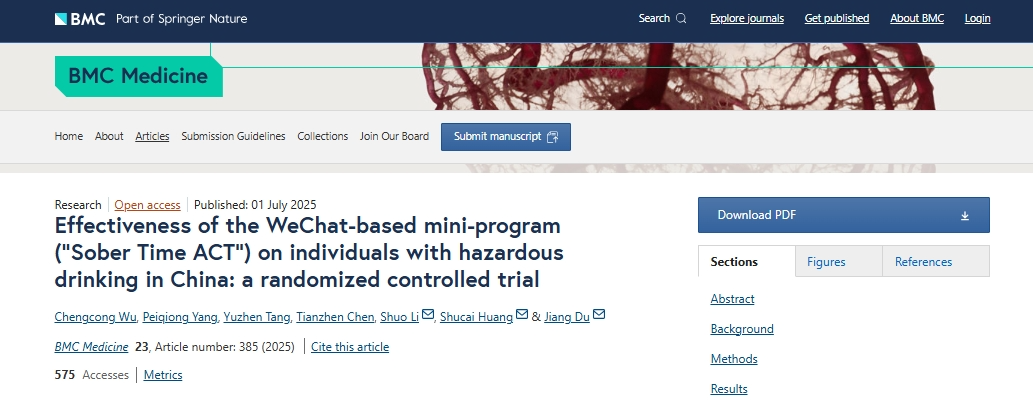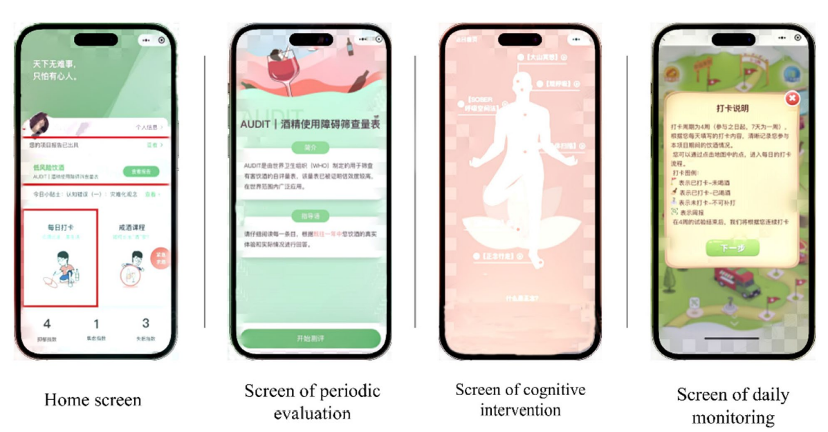The WeChat mini-program "Sobertime ACT" (Chinese: 清醒时光), jointly developed by Mindfront and the Addiction Medicine Department of Shanghai Mental Health Center affiliated with Shanghai Jiao Tong University School of Medicine, recently had its clinical research findings published in the world-renowned medical journal BMC Medicine (Impact Factor: 8.3).
BMC Medicine, a flagship medical journal under Springer Nature, is a top-tier academic publication in the medical field and a leading platform for addiction medicine research.

This three-year study marks China’s first digitally assisted addiction intervention validated through a multicenter randomized controlled trial (RCT), representing a groundbreaking advancement in the field of digital mental health intervention. It provides an innovative solution for at-risk drinkers among China’s over 500 million alcohol consumers.
The "Sobertime ACT" mini-program is built on a scientifically validated intervention framework combining Cognitive Behavioral Therapy (CBT) and Mindfulness-Based Relapse Prevention (MBRP). The RCT, involving 186 Chinese at-risk drinkers, confirmed its significant efficacy: integrating core CBT components (e.g., cognitive restructuring, behavioral activation) with MBRP practices (e.g., mindfulness meditation) achieved a 28% reduction in alcohol cravings within a 4-week intervention period.
The study’s innovation lies in being the first to embed professional psychological interventions within the WeChat ecosystem, featuring a web-based service platform for remote monitoring and clinical discussions. Its "zero-download, high-privacy" design, coupled with fully anonymized data processing, effectively overcomes traditional barriers such as limited treatment resources and patient privacy concerns.

Additionally, the mini-program offers personalized multimedia "alcohol use cognition courses" based on user assessments and check-in results, along with scenario-specific coping guides. It provides online mindfulness training for emotional regulation and a "24-hour emergency assistance channel," delivering a closed-loop management solution via digital means.
Professor Du Jiang, Director of the Addiction Medicine Department at Shanghai Mental Health Center and one of the lead authors of the study, stated:
"With advancements in mobile healthcare, real-time smartphone-based interventions for patients have become a key focus in chronic disease management. Based on this, Shanghai Mental Health Center partnered with Mindfront in 2020 to develop digital intervention technologies for patients with alcohol use disorder (AUD). The resulting smartphone-based mini-program, 'Sober Time ACT,' helps reduce relapse risk through daily check-ins while providing multiple psychological intervention modalities."
"Preliminary results from randomized controlled trials (RCTs) have validated its effectiveness in reducing alcohol cravings and improving negative emotional states. Moving forward, Shanghai Mental Health Center will collaborate further with Mindfront to optimize the program and gradually implement it in clinical practice."
Ms. Tian Mu, CEO of Mindfront, remarked:
"We are honored to collaborate with the expert team at Shanghai Mental Health Center, combining clinical intervention expertise with gamified digital technology—and demonstrating its value within the WeChat ecosystem. We look forward to expanding this partnership to benefit more patients in the future."
"Through continuous technological innovation and iterative improvements, we aim to advance China’s digital healthcare sector from research validation to large-scale application. Our goal is to make the 'pocket-sized mental health coach' model accessible to more users, fulfilling Mindfront’s commitment to 'accompanying your psychological growth' and ensuring professional mental health support reaches those in need."